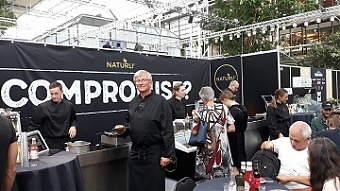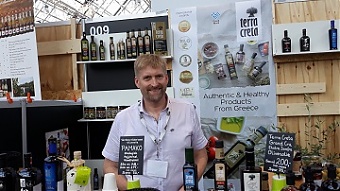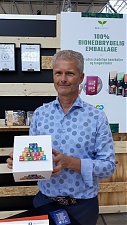Analytics, EU – Baltic States, Foodstuff, Forum, Modern EU
International Internet Magazine. Baltic States news & analytics
Saturday, 27.12.2025, 17:40
SDGs in action: food industry shows a lead in transition
 Print version
Print version |
|---|
| Picture I: vegan food |
Politicians, economists, food producers as well as customers
feel the need for changes and their input to sustainability. Global and
European competition for clients and consumers is increasing: Baltic Sea
state’s food industry sticks to quality goods and ingredients. Besides,
mitigation efforts in climate change make the food sector increasingly
vulnerable to measures to reduce negative production impact on climate issues,
e.g. in decreasing CO2 emissions. Global community headed by the UN has made a
strong message in resolving these challenges by suggesting sustainable
development goals (SDGs), which have become an integral part of all EU states’
decision-makers since the end of 2015.
For example, SDG-12 suggests that those involved in food industry
have to: a) reduce by halve per capita food waste at the retail and consumer
levels and reduce food losses along production and supply chains, including
post-harvest losses; b) substantially reduce waste generation through
prevention, reduction, recycling and reuse. These are quite fundamental changes
that are facing modern food production and processing in the Baltic Sea
region.
Bite in Copenhagen
The doors at Bella Center, the biggest in Denmark and
Northern Europe’s exhibition center, were open for two days at the end of
August 2019 for the yearly events dedicated to the most ambitious and
innovative entrepreneurs from the food industry. It is a unique platform
to showcase and manifest the latest trends within food production, technology
and innovation.
Under the motto “Food fair for the future” (popularly called
Bite-Copenhagen),
the food-show has gathered participants not only from Denmark but from several
EU states.
The
Bite-Copenhagen’s “highlights” included: brand new area ‘New
Gastro’, new-gastronomy stands; Bocuse
d’Or National Championship and that of Chef’s Talent-2019, open sandwich
competition, as well as master classes with leading experts, including food
tastings, networking and knowledge sharing, to name a few.
The food-show takes place each year at the end of August and
is famous for its carefully planned program supported by food competitions,
presentations and networking opportunities for visitors; and of course lots of
great tastings!
More in: https://bitecopenhagen.dk/home
; additionally on the exhibition manager, Christian Vejlund website in: https://bitecopenhagen.dk/press
Examples for the Baltic’s consumers
Among various interesting stands and food products, there
were some that could be valuable for the food industry in the Baltics; here are
three examples.
First of all,
it’s the trend towards vegan “way of live”, i.e. through organic food products
initiated by a Danish company called naturli’, which is famous for its
vegan and organic plant-based products since 1988. Already 600 shops in Denmark
presently sell vegan food!
More in the https://www.naturli-foods.com/products/
Company’s regional manager, Jens Dixen (Picture I: vegan food) served some ready-made dishes
(which tasted so good!) and underlined that vegan food has gained momentum in
Denmark. To my mind, that could be a good example to emulate in the Baltics; at
least the Baltic food producers have to give it a try.
 |
|---|
| Picture II – Extra Virgin Olive Oil |
Secondly, my
attention attracted superior quality olive oil from Kolymvari region of western Crete and produced from 100%
“Koroneiki” variety olives. Exceptionally pleasant and fresh taste of extra
virgin olive oil with the PDO category, has made me think that customers in the
Baltics would love it too (picture 2).
“Terra Creta” oil products, as well as other olive-based
goods can be traced on the compny’s website in: http://www.terracreta.gr/pages.aspx?lang=en&id=79
 |
|---|
| Picture III- Sustainable packaging |
Third, I was
thinking of the Baltic States packaging industry, which can have a new line of
interesting growth pattern instigated by the sustainability requirements
(picture III). As is well known, the industry is under great press from
environmentalists who wanted all packaging to be degradable, without any damage
to the nature as additional waste. These tasks have been successfully resolved
by KLSPurePrint
company, which is specialized, among other things, in “eco-printing”
facilities.
Use completely biodegradable packaging with KLS PurePrint. We produce high quality
sustainable packaging completely free of harmful substances, chemicals and
heavy metals. You get environmentally friendly packaging that is part of
nature's own cycle - as the only provider in the world.
https://klspureprint.com/services/productes/
Besides, at Bite Copenhagen one can experience the latest
solutions to future food challenges, which can be emulated by the Baltic States’
entrepreneurs, such as seaweed and snails production. Both are a kind of
novelty around the Baltic Sea but still quite perspective: at the Bite
Copenhagen the exhibitors have been a success! Although presently these kinds
of food stuffs are of modest consumption and having perhaps rather bleak
reputation, they can be of great effect as a sustainable food challenge.
Potentials for the Baltic aqua-farmers are constantly
increasing: potentials for seaweed have been known for a long time, but the
possibilities have in recent years also been revealed to chefs and food
producers in the Nordic countries. Today, more and more manufacturers are
working with the tasteful, sustainable and nutritious seaweed.
See more in the Faroe Seaweed company at: https://www.facebook.com/tarifaroeseaweed/
The company cultivates and processes seaweed, which is
primarily sold as ready-to-eat products and as ingredients for the food
industry. The seaweed advantages are great: they grow without feed and
fertilizers as seaweeds produce their own energy by photosynthesis. Besides,
CO2 is absorbed from the environment and oxygen is produced instead; nutrients
such as nitrate and phosphate are also absorbed by the environment when the
seaweed grows. The Baltic sea with a stable sea temperatures, good nutrient
supply and purity is an ideal place for seaweed cultivation.
Bite 19 in Denmark is over: the fair has offered a multitude
of inspiring exhibitors, non-stop talks, master classes and participant
competitors. It has been a fantastic fair with acquired new knowledge,
inspiration and ideas about new modes in food production, consumption, waste
management and people’s menus in future.








 «The Baltic Course» Is Sold and Stays in Business!
«The Baltic Course» Is Sold and Stays in Business!

